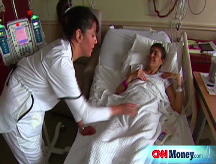A 3% raise this year? That's all folks
Survey of employers shows about half of businesses will cut back on salary increases, citing weak economy.
NEW YORK (CNNMoney.com) -- Millions of American workers will face miniscule pay raises in 2009, as employers look to cut costs amid an ongoing recession, according to a recent survey.
The semi-annual study conducted by Hewitt Associates, a human resources consulting and outplacement company, found that 50% of the 640 large companies it surveyed said they are planning on reducing labor costs. A quarter of employers said they are considering cuts.
The 640 businesses surveyed employ nearly 13.5 million workers, so the planned pullback in raises could affect between 7 million and 10 million employees, according to the survey.
Those companies cutting back are expected to reduce raises to less than 3% for the first time in the study's 32-year history. Salaried, overtime-exempt employees will get average raises of 2.5% next year, down from projections of 3.8% in July. Raises for salaried nonexempt workers will average 2.6%, down from 3.7%. And salaries for executives will rise just 2.2%, down from 3.8% in the middle of 2008.
"Clearly, many organizations and some industries are being negatively impacted by the economy, and short-term adjustments to reduce fixed costs are required to avoid pay freezes, layoffs, or in some cases, just to survive," Hewitt's practice leader, Ken Abosch, said in a statement.
The automotive industry is forecast to hand out the lowest raises in 2009, averaging just 1.4%, down from projections of 3.5% in July. Auto sector executives will take home even smaller raises, getting just 1.3%, compared to an anticipated 4% in the middle of 2008.
Education jobs will get raises of 2.3% next year compared to 3.5% expected in July. Finance sector employees will see a 2.9% bump in salary in 2009, down from 3.9%.
Still, there are some industries that will take home sizeable pay raises. Construction and engineering jobs are expected to average 4.5%; research positions will take home 4%; and employees at pharmaceutical firms will see a 3.9% bump.
To keep employees on board despite stingy raises, businesses are shifting to performance-based rewards and bonuses, the study showed. Of the companies surveyed, 69% offer such pay incentives, and 24% plan to add similar plans next year.
Still, companies are even scaling back incentive-based pay as a percentage of payroll expenses. Those programs are expected to fall to 11.1% of payrolls for salaried exempt employees from 12.1% in July. For salaried nonexempt employees, incentive-based pay programs will slip to 5.7% from 6.1%, the study said.
"Variable pay programs help organizations ... by allowing employers to more effectively manage fixed costs and focus on key business objectives, while at the same time motivating and rewarding employees for attaining performance goals and contributing to business results," said Abosch. ![]()


